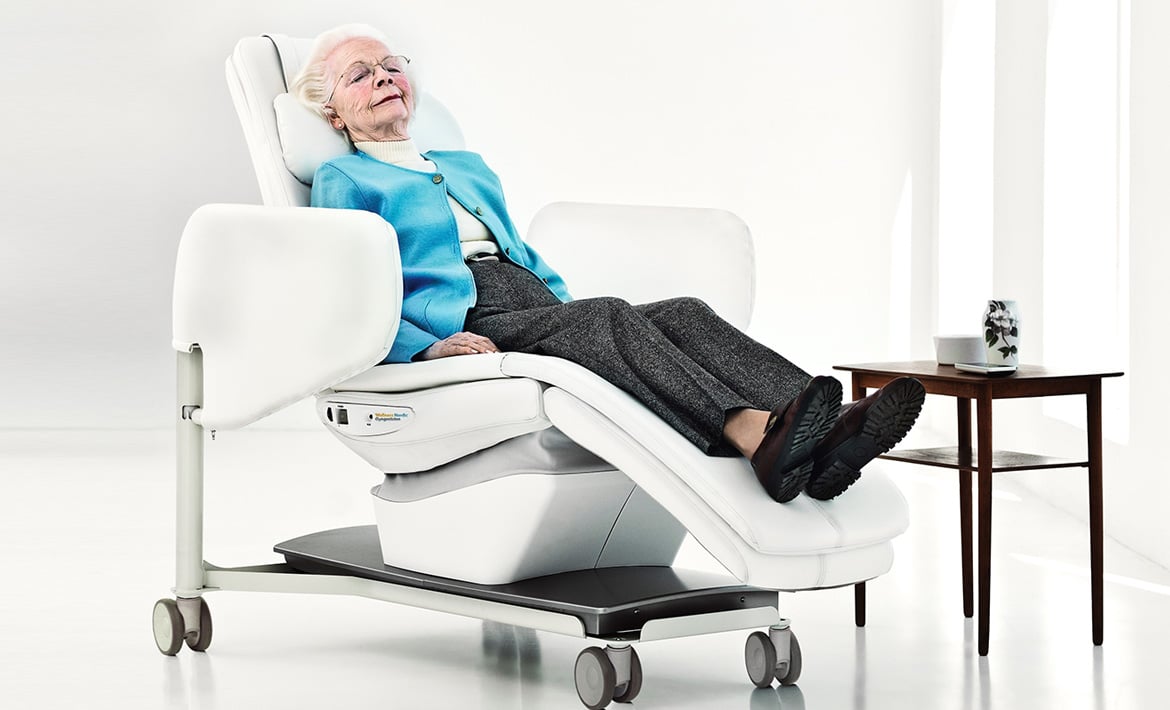Enhancing Life with Dementia: Soothing music and gentle motions
Author: Dawn Wiggins, RPN, MSc
Sensory Comforts for Enhancing the Well-being of Individuals with Dementia
Incorporating sensory features into the daily routines of individuals living with dementia can significantly enhance their well-being, especially during potentially stressful situations. For those with dementia, the progression of the disease can often disrupt the normal sensory processing and the ability to make sense of the environment, leading to confusion, anxiety, and a decreased ability to manage daily tasks independently. A chair that offers customizable music and a gentle rocking motion can be a soothing presence, providing comfort and reducing anxiety.

Dementia is a term that covers a wide range of specific medical conditions, including Alzheimer's disease. It describes a spectrum of symptoms associated with a decline in memory or other thinking skills severe enough to reduce a person's ability to perform everyday activities. The changes in the brain associated with dementia can affect mood, behavior, and physical functions, which can complicate care and the day-to-day flow of life.
An environment that is tailored to the needs of individuals with dementia is crucial. It can significantly affect their ability to engage with the world around them in a positive way. Mobility, a key factor in an individual's independence, can be greatly affected by dementia. As the condition progresses, the ability to move around can become more difficult due to a decline in physical abilities and spatial awareness, as well as increased anxiety about the possibility of falling or getting lost.
See how Gordon, a resident living with dementia, relaxes in the Wellness Nordic Relax® Chair before each shower:
However, when sensory features, like those in a specially designed chair, are utilized, they can contribute to a better flow of the day and sense of well-being. Playing calming music through the chair’s built-in speakers, for instance, can create a tranquil atmosphere that can help ease transitions into activities that may cause discomfort or distress¹. The familiarity of a favorite melody or the rhythm of a well-loved genre can offer a bridge to more peaceful and centered states of mind. Music has been known to tap into deep memories and can bring moments of clarity and recognition, even in the advanced stages of dementia.
“The soothing sway of a chair's gentle rocking can offer substantial comfort, mimicking the reassuring embrace of being cradled.“
When combined with the grounding pressure of a weighted lap blanket, it naturally stimulates the release of oxytocin, often known as the 'feel-good' hormone, which can lower cortisol, the stress hormone. This pairing not only has a tranquilizing effect but can also elevate levels of serotonin and dopamine, enhancing mood and overall well-being². Implementing the use of this feature before challenging tasks can help prepare an individual both emotionally and physically, making the experience less daunting. The rhythmic motion can serve to ground those who are feeling lost in the flurry of cognitive disruption that dementia often brings.
After a distressing event, the chair’s sensory features can also be employed to help individuals regain a sense of equilibrium. The combination of music and movement can aid in refocusing their attention, providing a gentle distraction from any upset they may have experienced. This can be especially helpful after incidents that may cause agitation or emotional distress, as it provides an immediate, non-pharmacological approach to soothe and comfort.
By thoughtfully integrating sensory features into the daily habits and routines of individuals with dementia, caregivers can create a supportive environment that not only addresses mobility needs but also contributes to a higher quality of life and a strong sense of well-being. The goal is to foster a sense of progress and achievement, no matter how small, which can be incredibly empowering for someone whose sense of self has been fragmented by dementia. These adaptations to the living environment, when used consistently, can help mitigate some of the challenges posed by dementia, offering a more harmonious daily experience for both the individual and their caregivers.
Overall, the use of sensory-enriched mobility devices and environments in the care of individuals with dementia represents a holistic approach that recognizes the complex needs of these individuals. It is a testament to the philosophy that by enhancing the sensory experiences, we can provide a level of comfort and familiarity that transcends the cognitive barriers imposed by dementia, ultimately affirming their dignity, and enhancing their quality of life.
Dementia Care Solutions Clinical Focus Guide
Due to the progressive nature of dementia and the potential presence of other chronic underlying conditions that may already affect mobility, the declining ability of the person to understand the task to be completed, along with communication challenges, it is easy to appreciate that hygiene care, mobility, and safe moving and handling are potentially complex aspects of supporting people with dementia.
Download our Dementia Care Solutions Clinical Focus Guide and learn about:
- Person-centered care for people living with dementia
- Overview and summary of needs when assessing hygiene and mobility risk
- Care recommendations for hygiene, mobility, and handling in dementia care
- Case examples from the Arjo Dementia Care portfolio
DOWNLOAD DEMENTIA CARE SOLUTIONS CLINICAL FOCUS GUIDE
Talk to an Arjo Solutions Expert
Learn more about Arjo’s wide range of dementia product solutions by speaking with an Arjo Solutions Expert, who will respond to your request in a timely manner.
References:
- Warren, J. D., Bolton, L. M., & Jiang, J. (2022). Music as a person-centred intervention for dementia [Rapid response to Managing neuropsychiatric symptoms in patients with dementia]. BMJ, 376. Retrieved from https://www.bmj.com/content/376/bmj-2021-069187/rr-0
- Williams, V. (2019, May 16). Mayo Clinic Minute: How weighted blankets may lift anxiety. Mayo Clinic News Network. Retrieved from https://newsnetwork.mayoclinic.org/discussion/mayo-clinic-minute-how-weighted-blankets-may-lift-anxiety/
 About the author
About the author